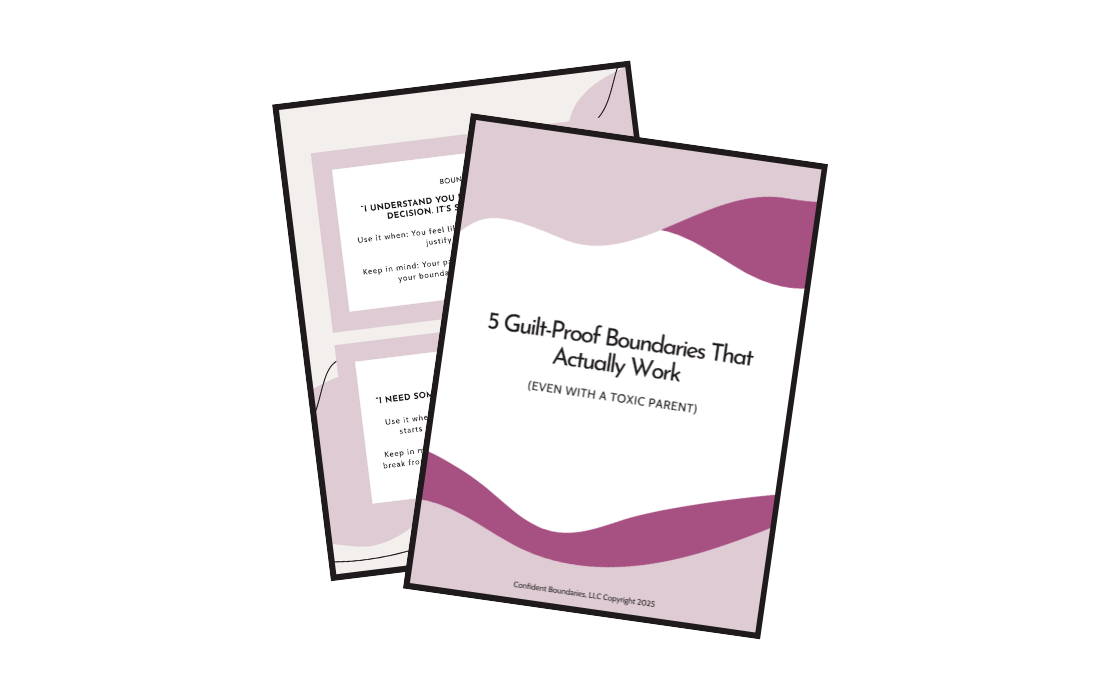
Parental Manipulation: Let’s Talk About It
If you’ve ever walked away from a conversation with your parent thinking, Wait, was that my fault? Am I the problem?—this one’s for you.
Parental manipulation is one of the most damaging and invisible dynamics in a dysfunctional family. It’s subtle. It’s confusing. And for so many of us raised by emotionally immature parents, it’s all we’ve ever known.
Let’s name it. Let’s unpack it. And most importantly, let’s talk about what to do with it—so you can start setting boundaries with toxic parents who’ve made you question your reality for far too long.
What Manipulation Really Looks Like (And Why It’s So Hard to See)
When we think about abuse, we often picture yelling, name-calling, or physical harm. But in families like yours and mine, the abuse often comes in more covert forms—like gaslighting, guilt-tripping, or triangulation.
These behaviors are common in parents with borderline or narcissistic traits. And if you’ve been on the receiving end, you know exactly how destabilizing they can be.
Here are a few of the most common forms of parental manipulation I see in my therapy and coaching work:
1. Gaslighting
This is when your parent denies your reality—telling you that something didn’t happen, that you’re overreacting, or that they never said that.
Over time, you start to believe them.
You stop trusting your gut.
You wonder if you are the problem.
Let me be clear: You’re not.
Gaslighting is emotional abuse. And it’s one of the most common tactics used by emotionally immature parents to avoid accountability.
2. Triangulation
This one’s messy. It’s when your parent pits you against siblings, other family members, or even your own children in order to maintain control. They might tell you what someone “really said” behind your back. Or use another family member to guilt or shame you.
It creates chaos. Distrust. Competition. And it makes it nearly impossible to have healthy family relationships.
If you’ve been caught in this cycle, you’re not alone—and you’re not imagining it.
3. Guilt-Tripping & Emotional Blackmail
Ever feel like no matter what you do, it’s never enough?
That’s not because you’re ungrateful or too sensitive.
It’s because you’re being manipulated.
Guilt-tripping sounds like:
-
“After everything I’ve done for you…”
-
“I guess I’m just a terrible parent.”
-
“Fine, do whatever you want—I’ll just be alone.”
This isn’t love. This is emotional blackmail—and it’s designed to keep you small, obedient, and ashamed of your needs.
4. Projection
Emotionally immature parents will often accuse you of doing the very things they’re doing.
If they’re being disrespectful? You’re suddenly the “disrespectful” one.
If they’re lying? You’re the “dishonest” one.
It’s confusing. And painful. Especially when you’ve spent your whole life trying to be the opposite of them.
This isn’t your fault—it’s a defense mechanism they’ve never learned to unlearn. But you don’t have to absorb it.
5. The Silent Treatment
When your parent stops speaking to you as punishment, that’s not just “cooling off.”
That’s emotional neglect.
And for kids raised in dysfunctional families, it’s often worse than being yelled at.
6. Jealousy and Competition
Narcissistic parents, in particular, can’t stand being overshadowed—even by their own children. If you’ve achieved something meaningful, and their response felt cold, dismissive, or weirdly competitive, this may be why.
They see your success as a threat.
Not as something to be celebrated.
And that’s heartbreaking.
But it’s not a reflection of you. It’s a reflection of their unresolved pain and emotional immaturity.
7. Flying Monkeys
You may have seen this term on Reddit. What it means is your parent sends someone else—usually a family member or friend—to guilt you, confront you, or pressure you into doing what they want.
It’s just another way of avoiding direct communication while still maintaining control. You are allowed to disengage. You are allowed to say no. You are allowed to set boundaries with the flying monkeys, too.
Setting Boundaries with Manipulative Parents Isn’t Easy—But It Is Necessary
When you grow up in a family where these behaviors are the norm, it can be so hard to recognize what’s healthy and what’s not.
You might think:
-
“Maybe I’m just overreacting.”
-
“Maybe I’m too sensitive.”
-
“Maybe I am the problem.”
You’re not.
You’ve just never been modeled what healthy boundaries actually look like. And now that you’re starting to see it—you get to start doing things differently.
Setting boundaries with parents, especially when they're toxic, doesn’t make you cruel. It means you’re protecting your peace and growing into an emotionally healthy adult.
Final Thoughts
Parental manipulation is not just “part of family life.” It’s a form of emotional abuse that leaves long-term scars—and you deserve to name it, heal from it, and break the cycle.
If you’re dealing with toxic parents, navigating the effects of emotional abuse, or trying to figure out how to set boundaries without the guilt consuming you—you’re not alone.
This work is hard. But it’s worth it. And you deserve that more peaceful life my friend.
You’re Not Crazy.
But you might have been gaslit by your parents.
Learn how to recognize the signs—and start rebuilding trust in yourself.
I hate SPAM. I will never sell your information, for any reason.



